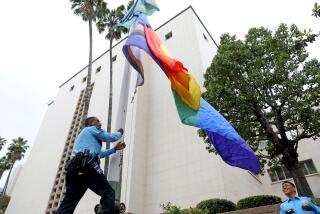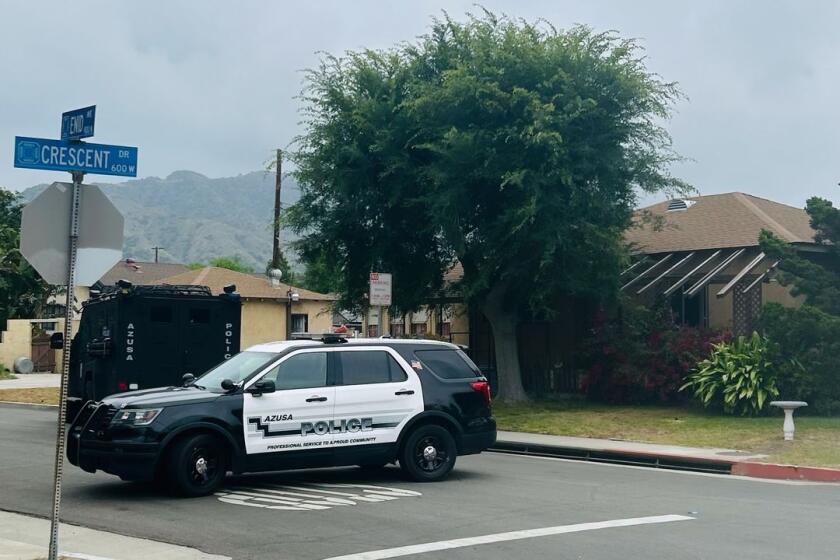Court OKs Government Use of Sex to Seize Suspect
Ruling that it is “unrealistic to expect law enforcement officers to ferret out criminals without the help of unsavory characters,” a federal appeals court has reinstated criminal charges against a suspected heroin dealer caught with the help of a prostitute acting as a government informant.
Overturning a U.S. District Court judge’s dismissal of the indictment as an example of “outrageous” government misconduct, the U.S. 9th Circuit Court of Appeals ruled that informant Helen Miller’s sexual relationship with the target of a heroin investigation was permissible, even though FBI agents knew about it and failed to stop it.
“The deceptive creation and/or exploitation of an intimate relationship does not exceed the boundary of permissible law enforcement tactics,” Judge William A. Norris wrote in the opinion distributed Wednesday to attorneys in the case. “The betrayed suspect might feel foolish or insulted, but cannot complain of government impropriety based on the use of deception alone.”
Employed as an Informant
Miller, who according to evidence presented in the case was known to the government as a prostitute and heroin user, was employed by the FBI in 1983 as an informant in an investigation of Darrel Simpson, a suspected heroin dealer living in Brentwood.
Posing as stranded travelers, Miller and a fellow informant, Karen Eccles, met Simpson at Los Angeles International Airport one day and joined him later at his apartment. Eccles testified that she had sex with a friend of Simpson’s, while Miller had sex with Simpson.
Over the next few months, Miller and Simpson continued to be sexually intimate. Simpson said that Miller repeatedly asked him to obtain drugs for friends, and said he finally acquiesced because of his love for her.
Though the supervising FBI agent warned Miller against having a sexual relationship with Simpson, U.S. District Judge Terry J. Hatter found, in dismissing the indictment against Simpson and two co-defendants, that the FBI “deliberately closed its eyes” to the situation and “probably expected her to continue.”
Norris, joined by Judge Procter Hug Jr. and Judge Cynthia Holcomb Hall, found that the government had done nothing so outrageous that it warranted dismissal on constitutional grounds. In the past, the courts have defined “outrageous misconduct” as coercive, violent or brutal treatment of a suspect, conditions which were absent in this case, the court ruled.
Win Confidence
“To win a suspect’s confidence, an informant must make overtures of friendship and trust and must enjoy a great deal of freedom in deciding how best to establish a rapport with the suspect,” the court ruled.
Moreover, Miller’s conduct with Simpson is not readily attributable to the government, given the FBI’s warnings against such a relationship, firmly meant or not, the court said.
May Use These Methods
“We recognize that many people in our society may find the deceptive use of sex in law enforcement to be morally offensive,” Norris acknowledged. “Nonetheless,” he added, citing a past court decision, “in order to apprehend those engaged in serious crime, government agents may lawfully use methods that are neither appealing nor moral if judged by abstract norms of decency.”
Joan Howarth, an attorney for the American Civil Liberties Union, which filed a friend-of-the-court brief in the case, was “very disappointed” with the decision.
“We believe that it taints law enforcement for our police officers to be setting up informants to have sexual relationships with suspects in order to get information,” she said.
Rehearing or Appeal
Simpson’s attorney, Joshua C. Needle, said he will either seek a rehearing on the case or appeal it to the U.S. Supreme Court.
“The court says that they will not find a violation of due process unless there is coercion, violence or brutality to the person,” he said. “I am very unhappy to see that the court is retrenching in this fashion.”
Edwin J. Gale, head of the U.S. Department of Justice’s Los Angeles Organized Crime Strike Force, which prosecuted the case, said: “There’s really nothing to say except that it has been sent back to the court for trial. It was, in part, the decision we sought.”
More to Read
Start your day right
Sign up for Essential California for news, features and recommendations from the L.A. Times and beyond in your inbox six days a week.
You may occasionally receive promotional content from the Los Angeles Times.






